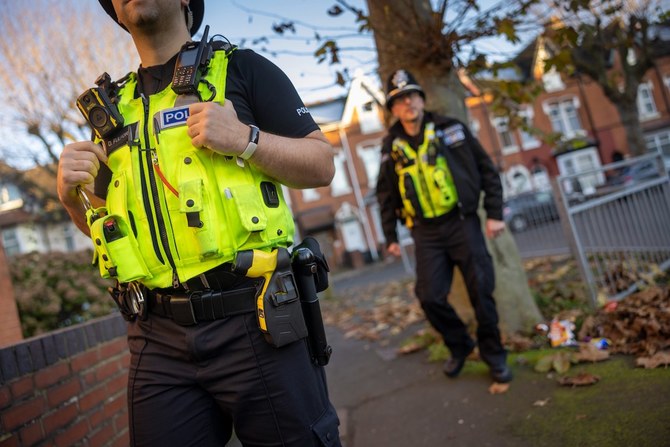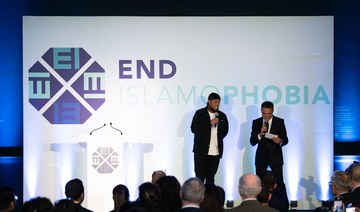LONDON: British police on Wednesday said a man arrested on suspicion of attempted murder after a man was set on fire on his way home from a mosque in central England had also been arrested for a similar incident in London last month.
In the first incident, an 82-year-old victim was engaged in conversation by a man as they both left the West London Islamic Centre before he was doused in a liquid, believed to be petrol, and set alight. Police said the injured man suffered burns to his face and arms.
The second victim, 70-year-old Mohammed Rayaz, was walking home from a mosque in the Edgbaston area of Birmingham on Monday evening when he was approached by a man who sprayed him with a substance and then set his jacket alight. He remains in hospital with severe injuries.
“At this stage we cannot speculate around the motive for the attacks, this is a live investigation and our main aim is to make sure communities are safe and that we bring justice for the victims,” West Midlands Police said in a statement.
On Tuesday, West Midlands Police said counterterrorism officers were supporting their investigation.
Rayaz’s family told the Daily Mail that he is being treated in hospital for serious burns to his chest, face and arms, and is in “extreme pain.”
His nephew told the Mail: “I’ve been to visit him and he looks in a very bad way. He’s not able to speak much and can’t see anything at all.”
The 27-year-old added: “He’s wrapped up in a lot of bandages and we are just praying that he recovers and that there (are) no long-lasting effects from this horrible attack.
“We don’t want to reveal the name of the hospital where he’s being treated but my uncle is in the intensive care unit and is being well looked after. We’re all praying for him.”
Sources told the Mail that the attacker had approached Rayaz and asked him: “Do you speak Arabic?” The pensioner replied: “I only speak Punjabi.”
Seconds later, Rayaz was sprayed with an unknown substance and set alight.
“We are all very upset and angry by what’s happened but it’s positive that the police took immediate action and responded to this attack very seriously,” Shahbo Hussain, a lawyer acting as a spokesman on behalf of the Rayaz family, told the Mail.
“This attack was dealt with by the UK’s counterterrorism unit and we’ve been meeting with them on a regular basis.
“The whole community is united in their condemnation of what happened. Our priority at this time is to support Mr. Rayaz and his family.”
Shabana Mahmood, MP for Birmingham Ladywood, on Wednesday said she had spoken to Rayaz on a video call.
“The victim and his family have been known to me for many years,” she said. “He is such a well-known, well-loved member of our community and it is very upsetting to see him bandaged up, unable to use or move his hands.
“He can’t see anything at the moment because his eyes are very badly swollen. As we know he does have very serious injuries to his face.
“He was able to speak and the first thing he said was thank you to the community for helping him and helping the police with their inquiries and getting an arrest so quickly.
“It was a real testament to his character and wasn’t thinking about himself even though he was in immense pain.
“The family are very touched with how everyone helped and got the evidence together for the police and we were able to chase minute by minute the movements of the attacker which must be of immense use to the police as they continue their investigation.”
The attacks have caused panic in the area, prompting officers to ramp up patrols. Meanwhile, Muslim leaders told the Mail that they fear copycat attacks.
Mohammed Khalil, a 68-year-old living near the Birmingham mosque, told the Mail: “I didn’t know the victim well but when we passed in the street, he was always a lovely guy.
“I have lived on this road for 46 years with my wife and nothing bad has happened here before.
“Since the incident everyone is living in fear. How do we know there aren’t more people going to do it or another attack is planned?”
Another resident echoed Khalil’s comments, adding: “There is a genuine fear amongst people about copycats doing this. In a video I have seen, it appears the attacker looked like he held up a phone and took a picture of the man on fire.
“If that is the case then I am frightened about this starting a horrible online craze. You already have people kicking doors for TikTok videos, what is next? Setting Muslims on fire and filming them as they burn?”
(With Reuters)




























